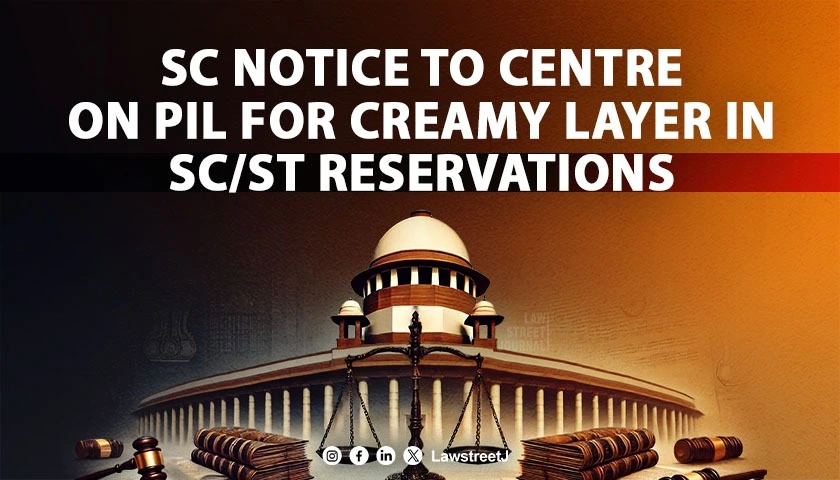NEW DELHI: The Supreme Court on Monday issued notice to Union government and others on a PIL for introducing creamy layer among the SC/STs so that the benefit of reservations does not get monopolised among a few influential sections among them.
The plea by Uttar Pradesh residents Ramashankar Prajapati and Yamuna Prasad, who themselves belonged to the reserved categories, sought a direction to implement constitutionally aligned reform to bring reservation benefits by income, so that the poorest within eligible communities receive the first preference.
Taking up the plea, a bench of Justices Surya Kant and Joymalya Bagchi said that counsel must “be ready to face lots of opposition,” due to far-reaching impact of the plea.
The plea filed by advocate Sandeep Singh and settled through advocate Reena N Singh stated creamy layer mechanism ought to be introduced amongst SCs and STs thus ensuring benefits reach the needy as without this, wealthy SC/ST families continued to claim benefits and enjoy intergenerational benefits.
The plea called for an urgent need to integrate economic criteria into the reservation policy to ensure that benefits are conferred upon those who genuinely required state support.
"The proposal does not seek to abolish or undermine caste-based reservations but rather to refine them to serve their intended purpose more effectively. By introducing an income-based prioritisation mechanism within SC, ST reservations, the proposed framework aims to prioritise opportunities for the most disadvantaged individuals amongst the SC-ST communities," it said.
The plea said, despite the implementation of reservations for over seven decades, many individuals from SC/ST backgrounds continued to face severe economic hardships.
"A small but influential section of SC/ST families has successfully leveraged reservations to attain high-ranking government positions, financial stability and quality education. This has led to intra-community economic stratification, where the relatively affluent continue to benefit from reservations at the expense of those who remain in financial distress," it said.
The PIL contended that despite decades of reservation the most economically deprived are often left behind with benefits captured by the relatively better-off within reserved categories. Prioritization by income will ensure help starts where it is needed most, it said.
The petitioners sought a direction to frame policies for a more equitable and just system of reservation in government employment and educational opportunities thereby ensuring equitable distribution of reservation benefits on a merit-cum-means approach.
They highlighted the economic disparities within these communities, which have led to an inequitable distribution of benefits under the existing reservation policies.
"While the reservation framework was initially introduced to uplift historically disadvantaged communities, the current system disproportionately benefits people belonging to relatively well-off economic strata and high social status backgrounds within these groups, thereby leaving the most economically deprived members with limited access to opportunities," the plea said.
It contended the current reservation framework suffered from significant gaps, such as equal treatment of candidates despite vast economic disparities, enabling economically privileged individuals within SC/ST/OBC categories to repeatedly avail reservation benefits, while poorer individuals remain underrepresented due to a lack of internal mechanisms to filter economic need.
This exposes a disconnect between social and economic backwardness, which undermines the objective of inclusive social justice. Constitutionally, this reform is supported by Article 14, which guarantees equality before law and promotes substantive equality; Article 15(4) and 15(5), which empower the State to make special provisions for socially and educationally backward classes including SCs and STs; and Article 16(4), which permits reservation in public employment for backward classes not adequately represented in services, it said.
These provisions together offer a flexible legal foundation to integrate income-based prioritization within reserved categories. The 103rd Constitutional Amendment, which introduced the EWS quota solely on economic criteria, sets a strong constitutional precedent for income-based inclusion and provides a logical basis to expand this model within SC/ST/OBC groups.
Moreover, statelevel sub-categorization of OBCs based on income or social status, as seen in Andhra Pradesh, Haryana, and Tamil Nadu, has already demonstrated administrative feasibility and effectiveness in equitable benefit distribution, it said.
Disclaimer: This content is produced and published by LawStreet Journal Media for informational purposes only and does not constitute legal advice. The views expressed are independent of any legal practice of the individuals involved.

















